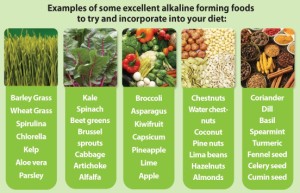Understanding pH and the Benefits of Keeping Your pH in Balance
Written by Miranda Yerrick, Nutritionist

Most of us know something about the pH scale if we think back to grade school science classes. The pH scale, or power of Hydrogen scale, runs from 1-14. The smaller the number the more acidic and the larger the number more basic or alkaline. Something that contains a pH of 7 is thought to be neutral. The human body likes to remain between 7.30-7.45, this means that our bodies are relatively neutral but a bit more alkaline than acidic. A lot of times people have issues with their body not being able to maintain the 7.30-7.45 and we tend to become acidic. An imbalance of pH can basically come down to one thing; our diet.
It is pretty safe to say that most Americans are consuming a diet that is entirely too high in salt and fat and way too low in whole foods such as fruits and vegetables. Meat and dairy can actually cause your body to become more acidic than it likes to be. Research has shown that having an imbalance of pH levels, specifically with increasing the acidity in your blood, could potentially damage your kidney and liver, two vital organs in our body. You may be thinking, but fruits and vegetables are surely acidic! Yes, for the most part they are. This isn’t the concern; the concern is the nutrients that are found in these fruits and vegetables and in meat and dairy. Fruits and vegetables tend to have higher levels of calcium, magnesium, and especially potassium. These three nutrients are the best at alkalizing your body or keeping you right where you need to be. Foods that contain high levels of chloride, phosphate, or sulfates are going to generally thrown your pH balance out of balance and increase the acidity in your body.
Many of us have heard that cancer cells thrive in an acidic environment and have a harder time surviving in a neutral or more basic environment. Not only do they thrive in acidic environments, but they also produce lactic acid which can make our bodies even more acidic. The theory is that if cancer cells thrive in acidic environments and you are able to balance out your pH levels, cancer cells would have a harder time doing damage to your body and possibly surviving. Not only is a pH balanced body something to strive for when diagnosed with cancer, it is something that you should really strive for at all times. A pH balanced body or alkaline forming diet can preserve and reserve enzymes in your body which can keep your digestive system working properly. Keeping your digestive system in top notch shape ensures that your body can break down foods properly and absorb the maximum amount of nutrients from those foods. Along with an improved digestive system, it also oxygenates your body more efficiently which can improve energy level and athletic performance.
So how do you manage your pH levels in an effort to make your body healthier? As stated above, diet is the most important thing. The Standard American Diet, or SAD, is crazy high in meats, grains (not typically whole), and sodas and unfortunately low in fruits and vegetables. Raw fruits and vegetables are specifically important when it comes to alkalizing the body. Those of you that are clients of The Mama Edna Project should be doing great when it comes to consuming high amounts of raw fruits and vegetables and should be well on your way to alkalizing your body. Make sure to always be drinking the correct amount of water for your body. Water is an alkaline promoting liquid and can help with pH imbalance as well as overall health. Keeping our bodies in pH balance really isn’t that hard to do! Be more conscious as to what you are eating, continue with your juices that are abundant in raw fruits and vegetables, drink plenty of water and reserve acid forming foods such as meats and sodas for an occasional treat.
15 Alkalizing Foods to Include in Your Diet
1. Almonds
2. Avocado
3. Leafy Greens (kale, collards, chard)
4. Root Vegetables (beets, turnips, carrots)
5. Broccoli
6. Water
7. Olive Oil/Coconut Oil
8. Lemon
9. Cucumber
10. Celery
11. Sweet Potatoes
12. Garlic
13. Coconut Water
14. Bell Peppers
15. Wheatgrass Juice